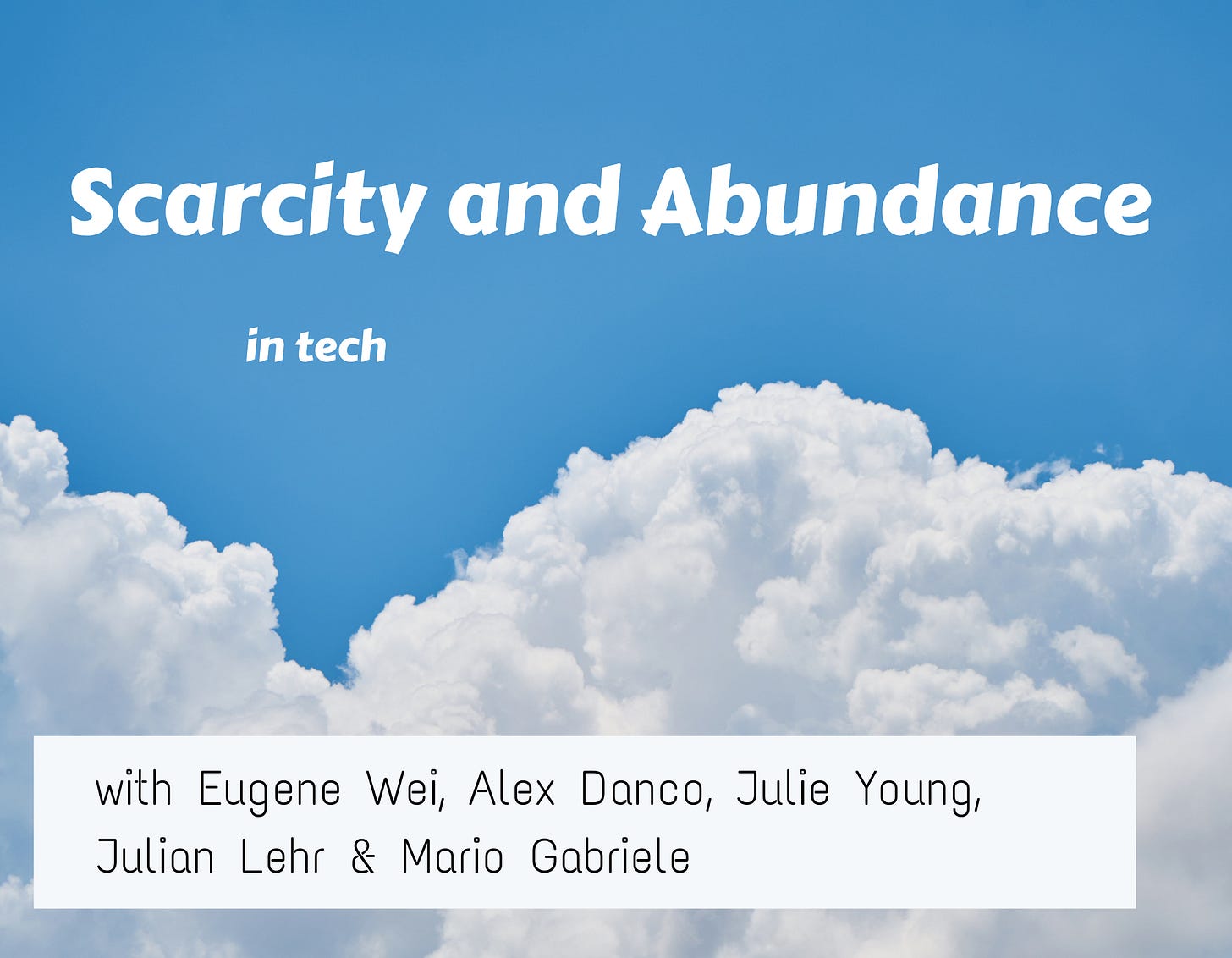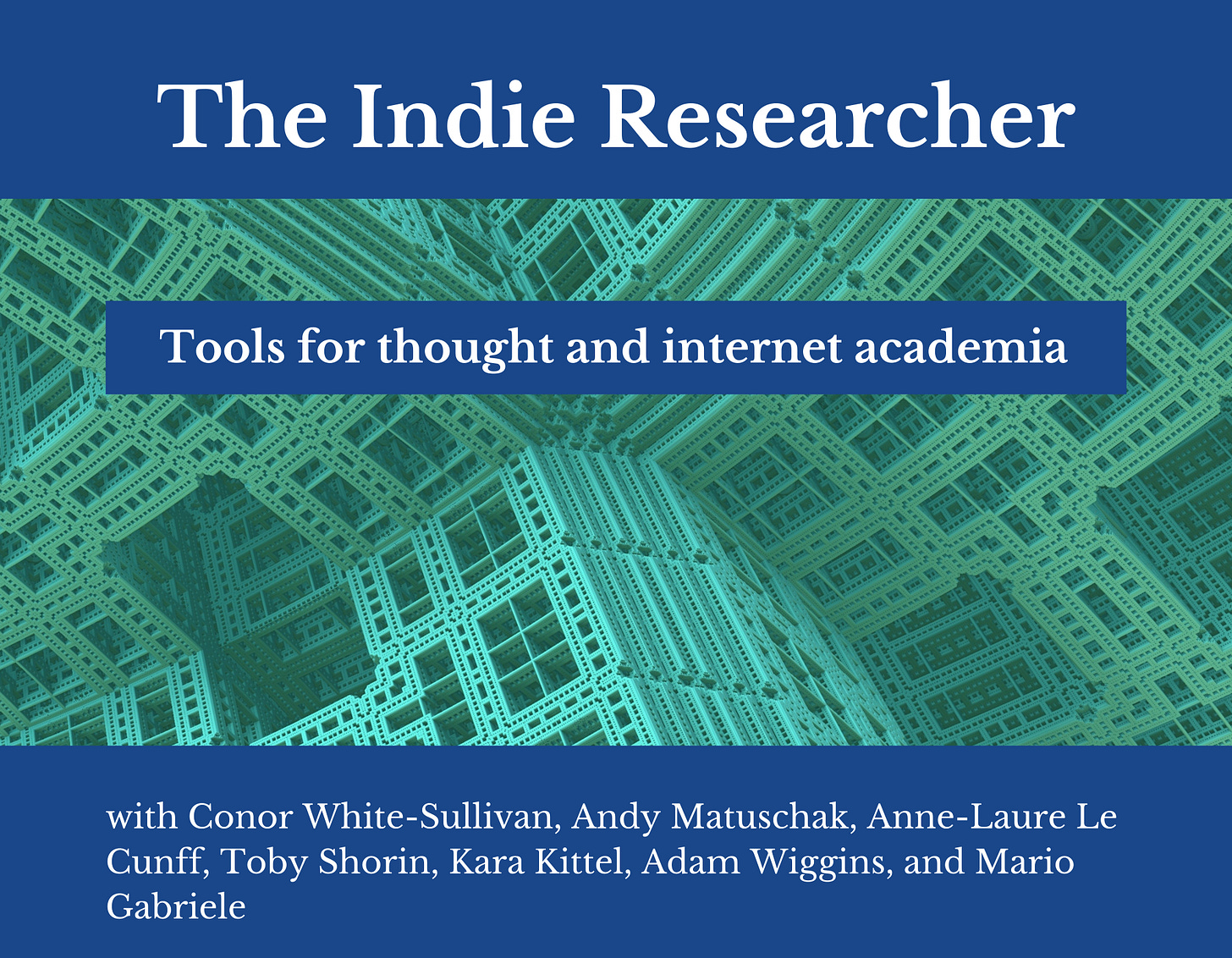Two events
The Generalist is hosting two events with tech’s most original thinkers. You can find both here.

Scarcity and Abundance in Tech
Sunday, November 1st @ 2 pm ET
Kevin Kelly once referred to the internet as a "copying machine," noting that "at its most foundational level, it copies every action, every character, every thought we make while we ride upon it."
In most cases, it does so at near-zero marginal cost. That's created a society of tremendous abundance: of information, entertainment, and connection.
But humans value scarcity, in so much as it grants status and serves to differentiate ourselves from coevals. Given that desire, how will technology adapt to meet the need?
We've gathered a collection of writers and thinkers that have spent time delving into this topic all so we might push the conversation further.
Line-up
Eugene Wei is one of the internet's most original thinkers. Via his newsletter Remains of the Day, he has shared canonical analysis on TikTok, algorithms, and online status. He's worked at the intersection of media and tech strategy at companies like Hulu, Oculus, and Amazon. I've admired his work for a long time.
Alex Danco has written several of my favorite-ever pieces — I really loved this winking, slippery article "Are Founders Allowed to Lie?" Prior to his current work at Shopify, he was an investor at Chamath Palihapitiya's Social Capital, one of the most intriguing venture funds of its time.
Julie Young is a consultant and uniquely effervescent, entertaining commentator on public equities. Through her prior work in AR at Snap's, she's well-versed in notions of programmatic scarcity. I highly recommend her analysis of gaming and payments company, Sea Limited.
Julian Lehr works at Stripe and writes beautiful, minimalist pieces about productivity, fitness, and tech. His writing on the topic of scarcity is elegant and enjoyable.
Topics
First of all, I'd like to invite you to share questions or subjects of interest in advance of the panel. What would you like to hear us talk about? Drop a question or comment in this Google Doc.
Other topics I hope to cover:
Dispo. YouTuber David Dobrik's new camera app introduces scarcity by limiting how you take pictures and when you can see them. The company raised $4M from Alexis Ohanian's new fund, 776.
MSCHF. The creative collective has taken cues from streetwear brands like Supreme in developing a "drop" model for its media and software products. Will others follow suit?
Scarcity and status. How do we use the internet and digital items to express who we are and who we're not? How might this change, and what role does crypto-assets have to play?
Gift culture and scarcity. Why do we give away our work for free?
Extra credit
If you're interested in this subject, here are some pieces you might enjoy.
"Status as a Service" by Eugene Wei
"The Kids are Alright," an interview with Julie Young and Eugene Wei by Alex Danco
"Signaling as a Service" by Julian Lehr
"Scarcity as an API" by Mario

The Indie Researcher: Tools for Thought
Friday, November 6th @ 1 pm ET
Douglas Engelbart, creator of hypertext and the mouse, foresaw a future in which humans and technology existed in less-turbulent symbiosis. “Technology should not aim to replace humans," he said, "rather amplify human capabilities.”
A crop of internet researchers has emerged in pursuit of this goal, studying the manner in which humans interact with technology and investigating how better tooling might improve our cognition. We've pulled together the leading lights of this movement to discuss their work and views on the future.
Line-up
Andy Matuschak is an independent researcher focused on investigating and creating "tools for thought." His series on that subject is one of the most thoughtful, and thoughtfully displayed, pieces I've read. Prior to going solo, he led research and development at online education company, Khan Academy.
Anne-Laure Le Cunff is the founder of Ness Labs, a productivity school for knowledge workers. She uses neuroscientific strategies to promote better, clearer thinking.
Check out Anne-Laure's work »
Adam Wiggins runs digital research lab, Ink & Switch, the organization behind iPad app Muse, a graceful spatial canvas for ideation. Prior to Ink & Switch, Adam founded cloud application platform Heroku.
Conor White-Sullivan is the founder of Roam Research, a note-taking application with superpowers. Roam has been one of the breakout products of 2020, building a #RoamCult on Twitter, and raising a $9 million seed round.
Kara Kittel is a creative producer and "experience strategist," which is one of the coolest job descriptions I've ever heard. She's the founder of Team Rolfes, an experimental VR studio, and previously worked as an Extended Reality (XR) producer at Meow Wolfe.
Toby Shorin is a partner at Other Internet, a research and strategy group. Toby has been on a tear of late, writing excellent pieces on "Squad Wealth" and "Headless Brands."
Topics
As above, I'd love your help defining and directing the conversation. Drop a question or comment into this Google Doc.
Topics I hope to cover:
The errors of traditional thinking tools. What are the mistakes word processors and task managers make? Where do these flawed ideas come from?
Market leaders. Which companies or products can be considered pioneers? What makes their feature set compelling?
Choosing fruitful research topics. How do the panelists identify promising areas? How do they refine and focus their interest over time?
Tools limiting thought. What behavior do current tools optimize for? What cognitive limitations does this place upon us?
The future of thinking, research, and expression. How will the internet and technology augment cognition and communication?
Extra credit
If you're interested in this subject, here are some pieces and podcasts you might enjoy.
"How can we develop transformative tools for thought?" by Andy Matuschak and Michael Nielsen
"Capstone, a tablet for thinking" by Ink & Switch
"How to think better" by Anne-Laure Le Cunff
"Premonition" by Toby Shorin, Kara Kittel, Drew Austin, Edouard Urcades
Puzzler
As always, clues given to those curious enough to message. All efforts welcomed, no matter how speculative. Today's riddle comes from the inimitable Tolkein.
Alive without breath, As cold as death, never thirsty, ever drinking, All in mail never clinking.
What am I?
Winning takes sacrifice. After finishing second several weeks in a row, Jeb B ensured he nabbed top spot by pulling into a gas station to answer last week's riddle in record time. He was joined by cerebral speedsters Tim R, Kaitlyn R, Keshav J, Rob M, and Eli K in supplying the correct response to our prior puzzler.
How can you take two away from five and have four left?
The answer? Remove the f and e. You're left with iv, or the number 4 in Roman numerals. Well played to those that jumped into the fray.
I very much hope to see you at the events mentioned above. If there are other discussions you'd like The Generalist to facilitate, I'd love to hear from you. My goal is to consistently bring together the most articulate, original thinkers so that we might all learn from each other. You're an essential part of that mission.
Wishing you a restful Sunday from Denver, wildfires at my back.
Until next time,
Mario


